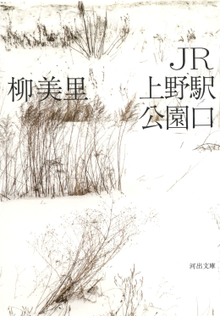 First edition cover (Kawade Shobō Shinsha, 2014) First edition cover (Kawade Shobō Shinsha, 2014) | |
| Author | Yū Miri |
|---|---|
| Original title | JR Ueno-Eki Kōenguchi (JR上野駅公園口) |
| Translator | Morgan Giles |
| Language | Japanese |
| Set in | Tokyo |
| Publisher | Kawade Shobō Shinsha |
| Publication date | 2014 |
| Publication place | Japan |
| Published in English | 2019 |
| Awards | National Book Award for Translated Literature (2020) |
Tokyo Ueno Station (Japanese: JR上野駅公園口, Hepburn: JR Ueno-Eki Kōenguchi) is a 2014 novel by Zainichi Korean author Yū Miri.
The novel reflects the author's engagement with historical memory and margins by incorporating themes of a migrant laborer from northeastern Japan and his work on Olympic construction sites in Tokyo, as well as the 11 March 2011 disaster. In November 2020, Tokyo Ueno Station won the National Book Award for Translated Literature for the English translation by translator Morgan Giles.
Reception
In its starred review, Kirkus Reviews called it Yu's "more restrained and mature novel" and praised her fusion of "personal and national history."
Lauren Elkin of The Guardian wrote that the novel "most effectively conveys its concerns through dense layers of narrative, through ambiguity rather than specific fates."
References
- Iwata-Weickgenannt, Kristina (2019). "The roads to disaster, or rewriting history from the margins—Yū Miri's JR Ueno Station Park Exit". Contemporary Japan. 31 (2): 180–196. doi:10.1080/18692729.2019.1578848. S2CID 166752041.
- "'Tokyo Ueno Station' by Yu Miri wins U.S. book award". The Japan Times. 19 November 2020. Retrieved 20 November 2020.
- Alter, Alexandra (19 November 2020). "Charles Yu Wins National Book Award for 'Interior Chinatown'". The New York Times.
- "Tokyo Ueno Station by Miri Yu ; translated by Morgan Giles". Kirkus Reviews. 29 March 2020. Retrieved 27 December 2020.
- Elkin, Lauren (3 April 2019). "Tokyo Ueno Station by Yu Miri review – haunting novel of life after death". The Guardian. Retrieved 27 December 2020.
This article about a 2010s novel is a stub. You can help Misplaced Pages by expanding it. See guidelines for writing about novels. Further suggestions might be found on the article's talk page. |